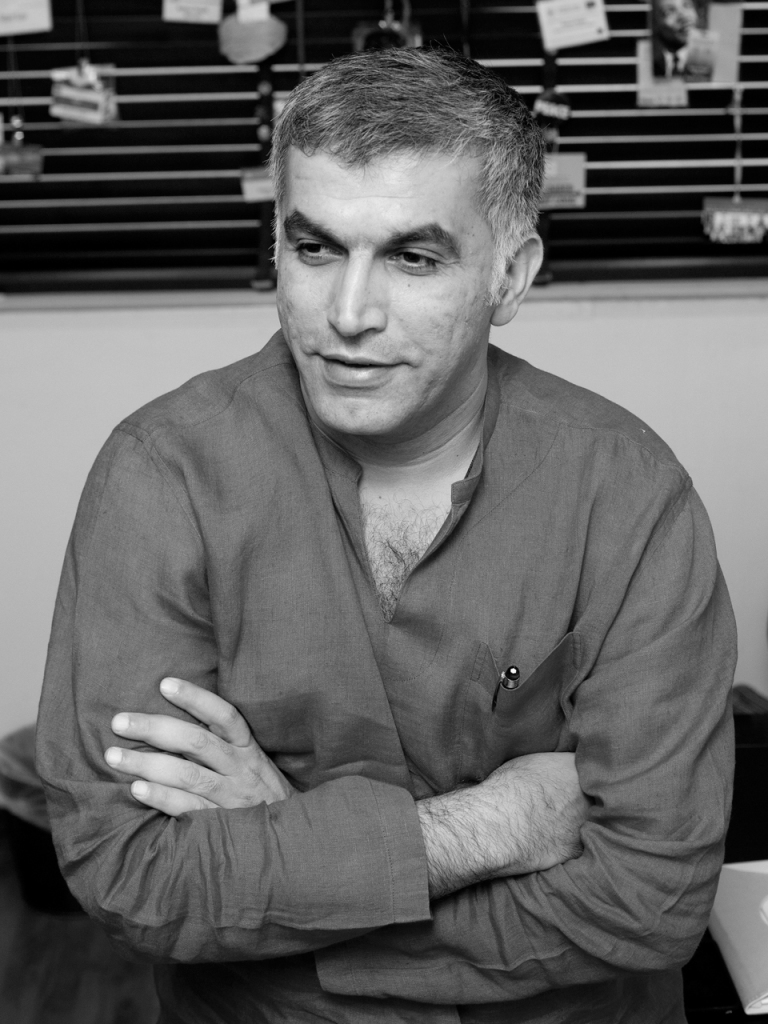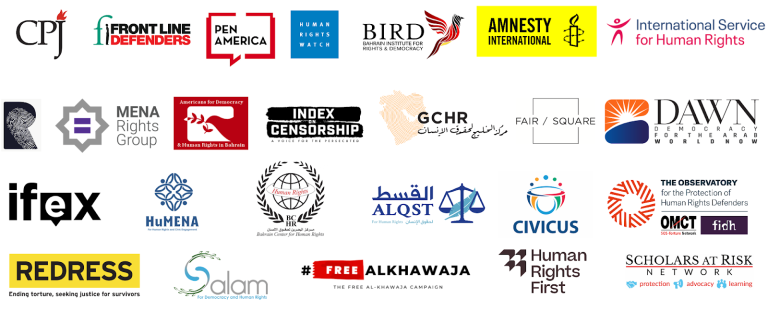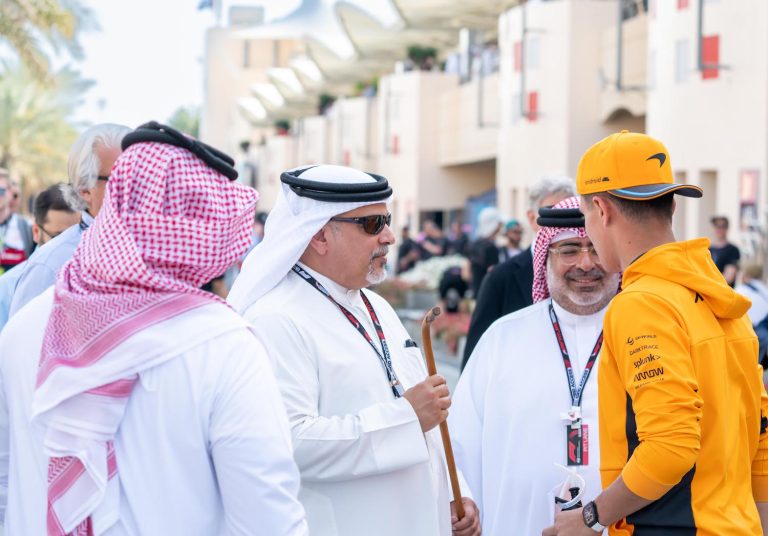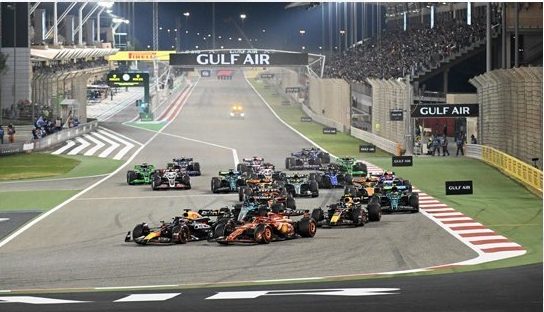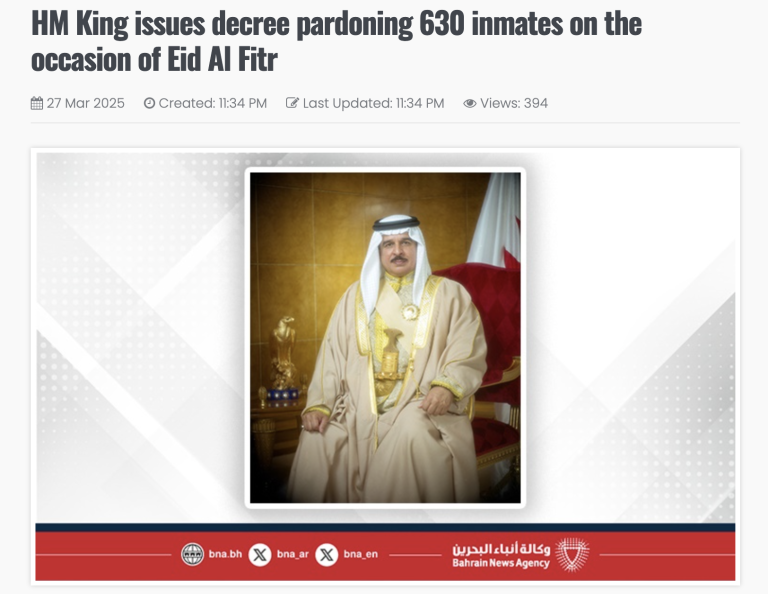8 November 2017 – Nabeel Rajab’s appeal against a two-year conviction for “spreading false news” is to conclude on 22 November, after a Bahraini appeals court today ignored the defence’s final arguments and denied Rajab bail. Rajab, one of Bahrain’s highest profile human rights campaigners and President of the Bahrain Centre for Human Rights, was sentenced in July 2017. Rajab faces another trial on 19 November in relation to his social media posts on twitter, for which he faces up to 15 years in prison, for a total of 17 years.
Rajab’s lawyers submitted video evidence of journalists and researchers denied entry into Bahrain which would dispute the charge that he “spread false news” by, among other things, stating the Bahraini government bars reporters and human rights workers from entering the country. However, the court, led by Judge Bader Al-Abdulla, today refused to play the evidence in court. Judge Al-Abdulla set 22 November as the final court hearing, when its judgement is expected.
Nabeel Rajab was sentenced in absentia to two years in prison on charges of “spreading false news” under article 134 of Bahrain’s Penal Code. His appeal began in September.
He is currently serving his sentence in Jau Prison, where he was transferred to on 25 October, after over six months in the Ministry of Interior Hospital. Rajab has been held in humiliating conditions and isolated from other inmates.
Today, Rajab was transferred to the Appeals Court in a vehicle which prison officers told him was used to transfer people sentenced to death, as opposed to the regular transfer bus. Rajab was photographed throughout the transfer and was kept in a suffocating heat in the vehicle, in which he struggled breathe. There are currently 16 people on death row in Bahrain, the majority of them sentenced to death in 2017. In January, three torture victims were unlawfully executed; the UN condemned the killing.
Rajab’s brother was barred from attending the court. Observers from the British, American and German embassies were present at the trial.
Sayed Ahmed Alwadaei, Director of Advocacy, Bahrain Institute for Rights and Democracy: “Nabeel has been subject to humiliating treatment by Jau Prison’s administration and the appeals court continues to deny him a fair trial. Bahrain continues to deny journalists and NGOs access. This is a fact, which Bahrain has imprisoned Nabeel for stating. The Government of Bahrain’s zero tolerance policy to human rights defenders is appalling, and yet instead of condemnation, Britain whitewashes the abuses while the US approves new arms sales to Bahrain.”
“Spreading False News”
The charges relate solely to TV interviews Rajab gave in 2014 and 2015. Without irony, prosecution papers from the criminal court proceedings, seen by BIRD, state that Rajab is being prosecuted for stating that the Bahraini government “derogates from freedom of opinion and of expression.” Bahrain’s prosecution has treated Rajab as a criminal for speech acts such as: “accusing the ruling system in the Kingdom of following a policy of repression” and of “arresting those opposed to the regime”; or alleging “the commission by responsible [government] bodies of crimes of killing and torture.” In the prosecution’s account Mr. Rajab has also made statements accusing the Bahraini government of “evasion of responsibility”; engaging in “sectarianism”; and “suppressing opposition and violating international agreements and covenants.”
Rajab was arrested on 13 June 2016 and has been detained ever since. He was held largely in solitary confinement in the first nine months of his detention, violating the UN Standard Minimum Rules for Non-Custodial Measures (Tokyo Rules) which state: “pre-trial detention shall be used as a means of last resort in criminal proceedings, with due regard for the investigation of the alleged offence and for the protection of society and the victim.”
In early April 2017, Rajab was admitted to the Bahrain Defence Force hospital for a necessary surgery. He was transferred back to police custody just a day later, before having recovered from his operation, and his health deteriorated significantly; from there he was transferred to the Ministry of Interior Clinic (Al-Qalaa), where he remains to date. Between April and August 2017, Rajab was unable to attend court, which held numerous hearings in his absence, including his sentencing. Rajab was transferred back to Jau Prison in October.
Rajab faces a concurrent trial on 19 November in which he faces up to 15 years in prison on charges related to his tweets exposing torture in a Bahraini prison and criticising the humanitarian cost of the war in Yemen. In September 2017, a new set of charges were brought against Rajab related to social media posts made in January 2017, when he was already in detention and without internet access. Rajab also faces a fourth set of charges related to a letter he penned to the New York Times in September 2016.
The UN Committee Against Torture has called for Rajab’s release.
The UK’s Middle East Minister Alistair Burt was in Bahrain in October, where he met with senior officials and expressed support for the government’s reform programme – a programme which only Bahrain and the UK claim exists. He said “The UK will continue to support Bahrain to deliver its ambitious reform initiatives, with a particular focus on rule of law and human rights.” There is no indication that they specifically raised Nabeel Rajab’s case.
In the US, the Trump Administration this year removed Obama-era human Rights conditions on arms sales, one of which was the unconditional release of Rajab. In September, the Trump Administration approved the sale of F-16 jets worth $2.78 billion.

